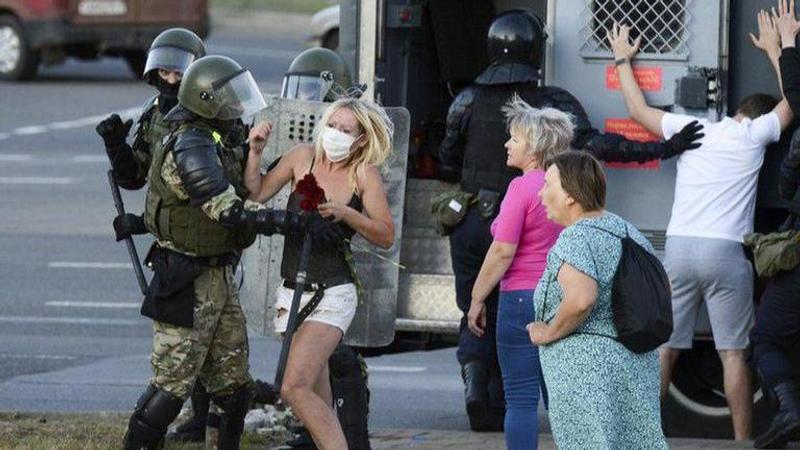Published 17:08 IST, August 12th 2020
Over 1,000 detained in latest Belarus election protests
Police detained over 1,000 people in Belarus during the latest protests against the results of the country's presidential election, officials said Wednesday.

Police detained over 1,000 people in Belarus during the latest protests against the results of the country's presidential election, officials said Wednesday.
Rallies took place in 25 Belarusian cities on Tuesday and overnight, Interior Ministry spokeswoman Olga Chemodanova told The Associated Press. Thousands have demonstrated in the capital of Minsk and several other cities for three nights to contest the election results.
The Central Election Commission reported that President Alexander Lukashenko won a sixth term in Sunday's election with 80% of the vote. Top opposition candidate Sviatlana Tsikhanouskaya, who had attracted massive crowds at campaign events where voters expressed frustration with the authoritarian Lukashenko's 26-year rule, got just 10%..
Police deployed to break up the post-election protests used batons, stun grenades, tear gas and rubber bullets. One protester died Monday amid the crackdown in Minsk, and scores were injured.
Belarusian human rights group Viasna said many people were afraid to seek medical help, fearing prosecution for participating in the protests.
“We have information that medical workers are obligated to report all injuries and wounds to the police, and doctors see the protesters not as victims but rather as enemies of Belarus' stability,” Viasna lawyer Pavel Sapelko said.
Earlier this week Belarus' Investigative Committee launched a criminal probe into mass rioting. Some 3,000 people were detained after Sunday’s protests and another 2,000 after rallies that started on Monday evening and lasted well into the night.
Belarusian state news agency Belta reported Wednesday that police detained “coordinators of mass riots” in the capital of Minsk. The detained men allegedly “managed hundreds” of protesters and were accused of paying them to participate in the unrest, Belta said..
Nearly 30 journalists are among those detained, the Belarusian Association of Journalists said Wednesday. Three already were sentenced to 10 to 15 days of administrative arrest and 25 more remain in custody, awaiting their turn to face a court.
During the protests on Tuesday night, reporters from several Belarusian and international outlets were beaten up. Officers seized memory cards from a group of photographers, including one for The Associated Press, as they took shots of the police crackdown.
“A deliberate hunt for journalists with independent Belarusian and foreign media has begun,” said Boris Goretsky, vice president of the journalists' association.
Lukashenko, who has ruled the country with an iron fist since 1994, has derided the political opposition as “sheep” manipulated by foreign masters and vowed to continue taking a tough position on protests.
Tsikhanouskaya, 37, a former English teacher who entered the race after her husband’s jailing in Belarus, left the country for Lithuania on Tuesday in an abrupt about-face , hours after publicly disputing the vote results and submitting a formal request for a recount. Her campaign said she made the move under duress.
Her departure from Minsk didn't discourage the protesters from taking to the streets again. Several told the AP that the rallies will continue.
The actions by police this week has drawn harsh criticism from the European Union and the United States.
Developments in Belarus will be on the agenda of an urgent meeting of European Union foreign ministers on Friday, EU foreign policy chief Josep Borrell tweeted.
The meeting was called a day after Borrell said that the 27-nation bloc would review its relations with Belarus and whether to take “measures against those responsible for the observed violence, unjustified arrests, and falsification of election results.”
In 2016, the European Union lifted most of the sanctions it slapped on Belarus in 2004 after Lukashenko, once dubbed “Europe’s last dictator in the West,” freed political prisoners and allowed protests.
This year the economic damage caused by the coronavirus and the president's swaggering response to the pandemic, which he airily dismissed as “psychosis,” has fueled broad anger, helping swell the opposition ranks and prompting the Belarusian leader to unleash a renewed crackdown on dissent.
Tsikhanouskaya, who lacks any prior political experience, entered the race after her husband’s arrest. She managed to unite fractured opposition groups and draw tens of thousands to her campaign rallies — the largest opposition demonstrations in Belarus since the 1991 collapse of the Soviet Union.
On Wednesday, nearly 200 women marched through central Minsk in solidarity with injured protesters, chanting “Shame!” and carrying flowers.
“We stand for a peaceful protest,” Ksenia Ilyashevich, a 23-year-old IT specialist, told the AP.
“We worked up the courage and came out to rally," she said. "Hundreds and thousands of Belarusians express solidarity with us, but are afraid (to come out). We stand here for all.”
Updated 17:08 IST, August 12th 2020




